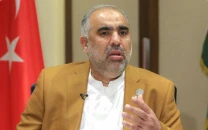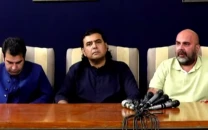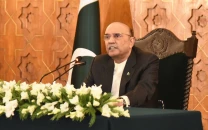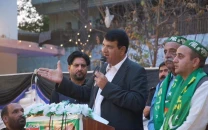Child rights: Govts urged to up allocations for children-specific issues
Six draft laws on child protection are pending in parliament.

The governments are lacking commitment in pursuing children-specific programmes
Sahil Executive Director
Manizeh Bano
In a year when an alarming number of child sexual abuse cases were reported, it was perhaps some consolation that Pakistani child rights activists on Monday got a verbal commitment from a parliamentarian that she would bring the issue of pending laws regarding child rights up in the National Assembly.
At least six different pieces of legislation on child rights are pending in the parliament, including the Criminal Law (Child Protection) Amendment Bill, originally introduced in 2009, which would protect children by criminalising child prostitution and child pornography.
“I assure you that I will try my level best to address the issue of these pending pieces of legislation,” Ayesha Gulalai, a Member National Assembly from the Pakistan Tehreek-e-Insaf (PTI), told child rights activists at the launching ceremony of a report on children-specific budgetary allocations at a local hotel on Tuesday.
The report, titled “Budget Analysis from a Child Rights Perspective: 2010-11 to 2013-14 (Federal and Provincial)”, was published by the Child Rights Movement, a coalition of over 120 non-government organisations (NGOs).
Gulalai linked the state of child rights, or human rights for that matter, in Pakistan with other problems such as flawed governance and the security situation. She said the federal and provincial governments need to set their priorities right and focus on the citizens’ well-being.
Earlier, activists demanded the government to increase budgetary allocations for children-specific issues such as primary education, healthcare, social protection and social welfare. The current budgetary allocations for children’s issues are insufficient, they said.
According to the report launched by CRM, the allocation for children-specific programmes in the Federal Budget 2013-14 is only around 0.68 per cent of the total budget. The four provinces, studied in the report, spend slightly more percentage-wise but, except Sindh, no province has maintained an increasing trend of spending on children-specific initiatives since 2010-11.
Amer Ejaz, the Executive Director of the Centre for Peace and Development Initiatives who worked on the budget analysis for the study, said children are not considered an entity in the accounts, so the funding for children-specific programmes is divided among the education, health and social protection.
Ejaz said this makes it difficult to quantify the exact amount of funds being spent on children but, he said, the CRM study indicates how little money is spent on obvious heads such as children’s health and education. For example, the 2013-14 budgetary allocations for children’s health at the federal and provincial levels varied between 0.47 to 15.58 per cent of the total health budgets, according to the report.
Manizeh Bano, Executive Director of Sahil said the governments will have to play the major role in ensuring funds are allocated for child protection and care.
“The governments are lacking commitment in pursuing children-specific programmes and that’s what we have to keep pushing for,” Bano said.
Abdullah Khoso, a Child Rights Governance Coordinator at Save the Children, said a national commission on child rights should be established to monitor and ensure the implementation of laws and policies that provide protection for children.
Participants and speakers suggested the allocation for children’s education should at least be five percent of the Gross Domestic Product. They also demanded tracking and monitoring of children-specific budgetary allocations to ensure the money is spent in a transparent manner.
Published in The Express Tribune, January 1st, 2014.



















COMMENTS
Comments are moderated and generally will be posted if they are on-topic and not abusive.
For more information, please see our Comments FAQ